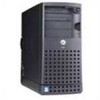Dell PowerEdge SC1420 Information Update - Page 11
System Info, CPU Info, Memory Info, Date/Time, Boot Sequence, Diskette drive, Internal, Drive 0-5
 |
View all Dell PowerEdge SC1420 manuals
Add to My Manuals
Save this manual to your list of manuals |
Page 11 highlights
Table 1-2 through Table 1-9 list the options and descriptions for each group of information fields that appear on the main System Setup program screen. NOTE: The System Setup program defaults are listed under their respective options, where applicable. Table 1-2. System Options Option System Info CPU Info Memory Info Date/Time Boot Sequence (Diskette drive default) Description Displays the System name, BIOS Version number, BIOS Date, Service Tag, Express Service Code, and Asset Tag. Displays the following information for the processor installed in the system: Processor Type, Processor Clock Speed, Processor Bus Speed, Processor Cache Size, Processor ID number, whether the processor is Hyper-Threading Capable, and if the processor has 64-bit Technology. Displays the amount of Installed Memory, Memory Speed, Memory Channel Mode, and a description of the Memory Technology. This option also displays a table that describes the memory size, whether the memory module is ECC capable, single or dual rank, type, and organization. Resets the system's internal calendar and clock. Determines the order in which the system searches for boot devices during system startup. Available options can include the diskette drive, CD drive, hard drives, and network. Table 1-3. Drive Options Option Diskette Drive (Internal default) Drive (0-5) (On default) Description Enables and disables the diskette drives and sets read permission for the internal diskette drive. Off disables all diskette drives. USB disables the internal diskette drive and enables a USB drive if the USB controller is enabled and a USB drive is connected. Internal enables the internal diskette drive. Read Only enables the internal drive controller and allows the internal diskette drive read-only permission. NOTE: Diskette drives are optional and may not be part of your system. Enables or disables a PATA or SATA device (such as hard-drive, CD drive, or DVD drive). Off disables the interface so that the device cannot be used. On enables the interface so that the device can be used. Displays the Controller type (PATA or SATA), Port number the drive is using, Drive ID number, Capacity, and whether the drive is controlled by the BIOS. NOTE: Drive 0 and drive 1 are reserved for SATA drives and drives 2-5 are reserved for PATA or IDE drives. Information Update 9















